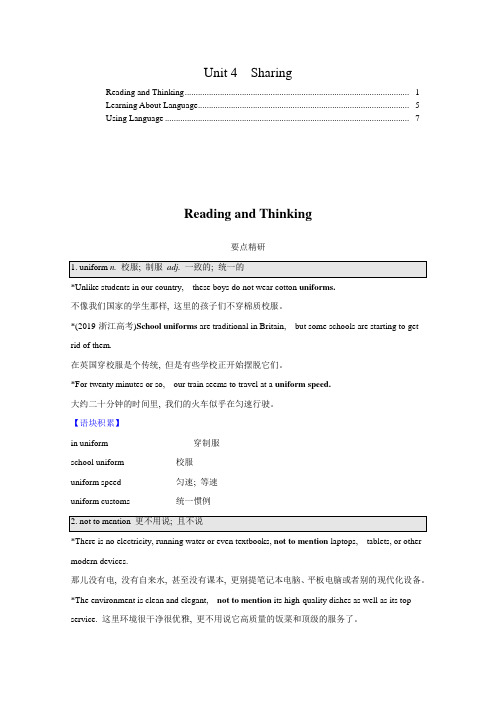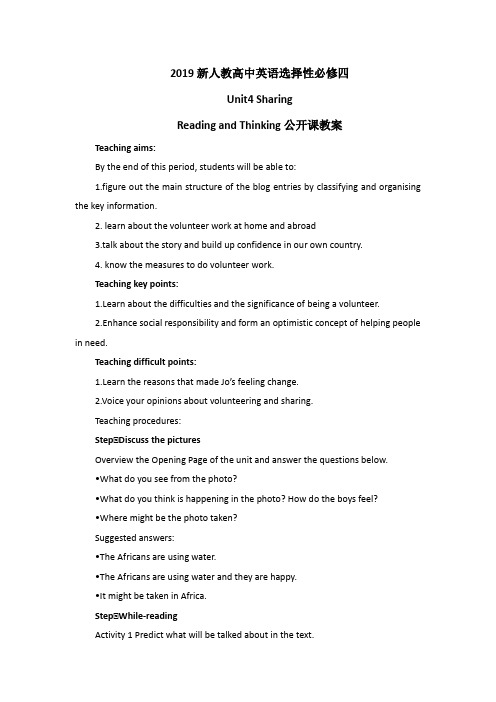Unit 4 sharing (reading)
- 格式:ppt
- 大小:8.69 MB
- 文档页数:90

Unit 4SharingReading and Thinking ...................................................................................................... - 1 -Learning About Language ................................................................................................ - 5 -Using Language ............................................................................................................... - 7 -Reading and Thinking要点精研*Unlike students in our country, these boys do not wear cotton uniforms.不像我们国家的学生那样, 这里的孩子们不穿棉质校服。
*(2019·浙江高考)School uniforms are traditional in Britain, but some schools are starting to get rid of them.在英国穿校服是个传统, 但是有些学校正开始摆脱它们。
*For twenty minutes or so, our train seems to travel at a uniform speed.大约二十分钟的时间里, 我们的火车似乎在匀速行驶。
【语块积累】in uniform 穿制服school uniform 校服uniform speed 匀速; 等速uniform customs 统一惯例*There is no electricity, running water or even textbooks, not to mention laptops, tablets, or other modern devices.那儿没有电, 没有自来水, 甚至没有课本, 更别提笔记本电脑、平板电脑或者别的现代化设备。





UNIT 4 Reading and Thinking第四单元VOLUNTEERING IN THE BUSH在丛林里做志愿者8 March3月8日I just got a parcel from home! It took about two weeks to arrive,and it was a bit damaged,but it was so nice to get some sweets and jam from home;I’ve been dying to have some of my favourite sweets,and it’s always nice to get mail!我刚从家里收到一个包裹!它花了大约两个星期才到达,而且有点破损,但能从家里弄到一些糖果和果酱真是太好了;我一直渴望得到一些我最喜欢的糖果,收到邮件总是很好!So I’ve been here in the jungle for about a month now. My secondary school is a bush school. The classrooms are made of bamboo,with clay floors and roofs of grass. It takes me only a few minutes to walk to school down a dusty track covered in weeds. When I reach the school grounds,I’m greeted by a chorus of“good morning”from the boys. Unlike students in our country,these boys do not wear cotton uniforms,and many of them also have to walk a long way,sometimes for up to two hours,just to get to school.我已经在丛林里呆了一个月了。


人教选修七 Unit4 Sharing词汇语言点Unit4 Sharing一.单词考点Section A Warming-up,Reading&Comprehending1.(be)dying to do sth.渴望(迫不及待地)做某事(=(be)thirsty to do sth.)eg:We are dying to get started.“渴望得到某物”的多种表达方式:be dying for=be eager to do sth.=be eager for sth.=be thirsty to do sth.=be thirsty for sth.=be anxious to do sth.=be anxious for sth.=long to do sth.=long for sth.=desire to do sth.=have a strong desire for sth.2.day短语the other day“几天前,不久前的一天”一般过去时的标志。
one day“一天”过去或将来的标志some day“总有一天”将来时的标志。
to this day“直到今天”现在完成时的标志。
these days“如今,现今”现在时的标志。
3.relevant adj“有关的,切题的”搭配:be relevant to介与……有关(=have relevance to sb./sth.=be related to sb./sth.=be linked to sb./sth.=be associated to sb./sth.=be involved with sb./sth.=be connecteddry up(指河流、湖泊、井等)干涸;(供应等)枯竭dry off(使)变干注:dry out主要指浸水之物“完全变干、干透”;dry up主要指河流、湖泊、海洋、井等水域“干涸”。


Unit 4 Reading Sharing 知识点讲解郑州市高中英语名师工作室昝亚娟1. It was wonderful to hear from you. 收到你的信真是太棒了。
It 为形式主语, 代替动词不定式to hear from you。
(2) hear from 收到某人的来信It was good to hear from Tom again.I look forward to hearing from you.【拓展】hear of 听说hear about 听说2. I know you're dying to hear all about my life here. 我知道你急于了解我在这儿的生活情况。
be dying to do sth急于做某事=be eager to do sth =long to do sthI am dying for a glass of beer.【拓展】be dying for sth= be eager for sth= be thirsty for =have a strong desire for Mary is dying for a holiday.People in that country are thirsty for change.3. It takes me only a few minutes to walk to school down a muddy track. 沿着泥泞的小路走, 几分钟我就到学校了。
It为形式主语代替动词不定式to walk to school down a muddy track.It takes (somebody) something (to do something)It took a few minutes for his eyes to adjust to the dark.4. Many of them have walked a long way, sometimes up to two hours, to get to school. 他们中许多人走了很长的路,有时候要走两个小时才能到学校。


2019新人教高中英语选择性必修四Unit4 SharingReading and Thinking公开课教案Teaching aims:By the end of this period, students will be able to:1.figure out the main structure of the blog entries by classifying and organising the key information.2. learn about the volunteer work at home and abroad3.talk about the story and build up confidence in our own country.4. know the measures to do volunteer work.Teaching key points:1.Learn about the difficulties and the significance of being a volunteer.2.Enhance social responsibility and form an optimistic concept of helping people in need.Teaching difficult points:1.Learn the reasons that made Jo’s feeling change.2.Voice your opinions about volunteering and sharing.Teaching procedures:StepⅠDiscuss the picturesOverview the Opening Page of the unit and answer the questions below.•What do you see from the photo?•What do you think is happening in the photo? How do the boys feel?•Where might be the photo taken?Suggested answers:•The Africans are using water.•The Africans are using water and they are happy.•It might be taken in Africa.StepⅠWhile-readingActivity 1 Predict what will be talked about in the text.Before your reading, list details in the first two columns. Fill in the last column after reading.Suggested answers:Look at the title “Help the needy” and the two pictures on Pages 38-39,answer the following questions.1.What does the “needy” mean?2.Who are the needy? What do they need?3.Why should we help them? 4.What can you see in the pictures? Activity 2 Reading for the structure.Read the blog entries and choose the main idea of each part.Suggested answers:Paragraph 1: AParagraphs 2-3: DParagraphs 4-7: BParagraph 8: CActivity3Reading for details.Read Paragraph 1 of the blog entries and answer the question.What can we infer from the sentence “I’ve been dying to have some of my favourite sweets, and it’s always nice to get mail!”?Suggested answer:She can’t buy her favourite sweets there and the communication conditions are poor.Activity4Reading for details.Read Paragraphs 2-3 of the blog entries and complete the table.Activity5Reading for details.Read Paragraphs 4-7.Write T(true) or F(false) and correct the false statement(s).1.Jo and another teacher took the bus to get Tombe’s village.2.There was a comfortable bed for Jenny and Jo to sleep on.3.The possessions in the hut were one broom, a few saucers, a kettle, cups, pans, and a couple of jars.4.Tombe’s family were talking in English during the meal.Suggested answers:1.F Jo and another teacher walked for two and a half hours to get Tombe’s village.2.F There was a platform for Jenny and Jo to sleep on.3.T4.F Tombe’s family were talking in their language during the meal.Activity6Reading for feelings and attitudes.StepⅠPost-readingpare our school with the one described in the text, and then fill in the table below.2.Ask students to discuss these questions in groups.(1)Jo felt it was a privilege to have spent a day with Tombe’s family. If you were Jo, how do you think you would have felt?(2)Why do you feel it?(3)Would you like to become a volunteer teacher? Why or why not?StepⅠ HomeworkFinish what you have learnt in the last column of KWL chart.Suggested answer:I have learnt many useful words and expressions to describe the volunteer job and I will find out more measures to do volunteer work.。

Unit4 SharingWarming-up and Reading教材分析本单元的话题是sharing,主要涉及帮助弱者、志愿服务、合作分享等,通过听、说、读、写等各种活动学习相关的语言知识,使学生了解世界上很多地方依然很落后,从而懂得同情、学会分享;了解一些志愿者工作的信息,培养学生互助合作的精神和社会责任感,结合针对短文话题的探讨激发学生的国家意识,通过各种渠道力所能及地为贫困地区的孩子作出自己的贡献。
Reading是一篇Jo写给Rosemary的信。
其中介绍了Jo在PNG(Papua New Guinea)的一个小山村教书。
在信中,作者以该村学校的情况和去一个学生家做客的经历,使学生感受到了PNG的儿童生活处境的艰难,从而更加珍惜自己的学习机会。
本人针对Reading所涉及的内容,设计了相对应的课件和教案,以下是教学的设计:I. Teaching Goal:1. Knowledge and Skilla. Key words and phrases: volunteer, hear from, be dying to, come across, relevant, stick out, doorway, adjust, platform, soft, softly, grill, dry out, dry up, privilege, arrangementb. Enable the students to learn about PNG and Jo’s work in PNG as a volunteer teacher.c.Encourage the students to talk sth. About sharing, which aims to train students’ ability to speak.2. Emotion and Attitudea. Cultivate students a good emotion about what is sharing and pay more attention to the value.b. Help the students understand the meaning of the volunteer work.3.Process and MethodsDiscussion, skimming, scanning and task-based methodII. Teaching importance:How to grasp the main idea of the text and how to understand the detailed information of the letter.III. Teaching difficulty:To comprehend the text is very important. Help them learn how to have a thorough understanding of sharing and voluntary work.IV. Teaching AidA recorder, a projector and PPT.V. Teaching Procedures:Step1. warming-up1.Talking about sharing by showing some pictures and what some famous peoplethink about itAs Kofi Annan said “ … each contribution- no matter how small- can help make a difference.”Give roses to others and the lasting fragrance will remain in your hand.If everybody offers a little love, the world will become more beautiful.Share your happiness with others, happiness doubles;Share your sadness with others, sadness halves;Share your love with others, love spreads.2.Talking about Volunteers, let students have a understading of the word.Look at the sign: What does the sign stand for?The sign of United Nations Volunteer in China(中国青年志愿者)①What does the sign remind you of?Y stands for youthA hand: ________________A dove:_________________Aheart:_________________Aletter:_________________(中国青年志愿者(United Nations Volunteer in China)标志的整体构图为心的造型,同时也是英文“青年”的第一个字母Y;图案中央既是手,也是鸽子的造型。

Unit 4 Sharing阅读课教学设计一、教本解读(Explanation about textbook)教材版本:普遍高中课程标准实验教科书(人教修订版)学科:英语年级:高二年级册别:选修7二、教学内容:(Teaching content)课题:Unit 4 Sharing (Reading: A letter home)This class is a reading class. The class’topic is “volunteers”and “sharing and helping those in need”. The reading passage is a letter which is mainly about Jo’s teaching experience and life in Papua New Guinea as a volunteer teacher.三、教学目标(Teaching aims)知识目标(aims for knowledge)1. Get students to learn some new words and expressions: relevant, doorway, adjust, platform, grill, privilege, concept, jar, tin, broom, be dying to, adapt to, the other day, come across, stick out, dry up.2. Let students learn about volunteers.能力目标(aims for ability)1. Train students’ reading skills and the ability.2 . Develop students’ creative thinking.情感目标(emotional aims)1.Stimulate students’ interest and enthusiasm in becoming a volunteer.2.Develop students’ awareness of sharing and helping those in need.3.Develop students’ sense of cooperative l earning.四、教学重点(Teaching important points)1. Let students learn about volunteers and the importance of sharing and helping those in need.2. Let students’ learn different reading skills.五、教学难点(Teaching difficult points)1.Develop students’ reading abili ty, esp. the ability of further understanding passage beyond the lines.2. Develop students’ creative thinking.六、教学方法(Teaching methods)Co-operative learning, discussion, Task-based learning七、教学手段(Teaching aids)The multimedia and other normal tools八、教学设计理念(Teaching design concept)Unit 4 Sharing (Reading: A letter home)这一阅读课倡导英语新课标理念下的合作学习。

![[中学联盟]广东省汕头市东厦中学高中英语选修7:Unit4Sharingreading1课件(共32](https://img.taocdn.com/s1/m/ab1f06cf866fb84ae55c8d46.png)



重庆市合川太和中学新人教版高中英语“五环节”教学模式阅读导学案选修七Unit4 Sharing Reading编写人:徐建均Leaning Aims1. Knowledge objects: to learn some new words and expressions; to get a better understanding of volunteer work.2. Ability objects: to understand the text fully and improve your reading ability.3. Moral objects: to be proud of volunteer work and learn to be helpful.Learning Keys and DifficultiesTo read between lines and comprehend the passage completely by knowing logi cal relations between facts and reasons. Learning MethodsFive-step method (self-study, cooperative inquiry, guidance, reflection, self-testing)Instructions1. Self-study: finish it before class;2. Cooperative inquiry: discuss in groups and show;3. Guidance: the teacher will guide you to learn and discuss;4. Reflection: reflect on what you have learned in this class;5. Self-testing: finish the homework after classLearning StepsStepⅠSelf-study (自学)W ord studyRead and understand the following words and expressions. Pay more attention to the bold ones.airmail ; volunteer ; fortnight ; roof ; muddy ; textbook ; concept ; weekly ; relevant; remote ; weed ; hut ; rectangular ; adjust; platform ; broom ; tin ; jar ; sniff ; participate; interpreter ; grill ; otherwise; privilege ; paperwork ;arrangement ; hear from; (be)dying to; the other day; dry ou t ;dry up.StepⅡ Cooperative Inquiry and Guidance(合作探究与导学)W arming up1.Do you know the United Nations V olunteer in China? Which sign stands for it? What can you see in the sign?2. There are many volunteers doing different kinds of thins to help others. What do volunteers often do?Pre-reading1. Who is Jo? Jo is a , who worked as in .2. Look at the photos taken by Jo. What are the houses made of? Are people well-dressed or poorly-dressed? Skimming1. 1) Work in groups to choose the main idea of each paragraph; 2) write down your answers and check between groups; 3) share your skills on how to find the answers quickly.( ) Para.1 A. What Jo’s school life like?( ) Para.2 B. Jo’s first visit to a village( ) Para.3 C. How the villagers cooked meals( ) Para.4 D. Jo said goodbye to the villagers( ) Para.5 E. The way to deal with leftover food( ) Para.6 F. What the hut was like重庆市合川太和中学 新人教版高中英语 “五环节”教学模式阅读导学案( ) Para.7 G . Jo ’s teaching( ) Para.8 H. The end of the letter( ) Para.9 I. The purpose of the letter★Note: We may get the main idea of each paragraph from .2. Divide the text into four parts, and match the main idea. Write down your answers, then check and show.Part Ⅰ ( 1) Part Ⅱ ( ) Part Ⅲ ( ) Part Ⅳ ( 9 ) The end of the letterJo’s visit to Tombe’s home in the villageThe purpose of the letterJo’s school and her teaching work→ Main idea of the text : , who worked in as a wrote aletter to her friend to talk about her experience in school and her first to a local village. ★ Note: Sometimes we can ’t get the main idea from the first or last paragraph, but we can .Careful Reading1.Listen and read Part Ⅱ.Answer the following questions. Get the key words in the questions first.1) Every morning who says hello to Jo?2) What happened when doing chemistry experiment?★ Note: We can find the answers quickly by using .2. Read Part Ⅲ to finish the chart in groups.★ Note: Don ’t do a blind search; relate the items to its main idea first.Comprehending☆ How did Jo feel after the visit to Tombe’s family? ( )A. HappyB. Sad.C. WorriedD. Upset ★Note: Y ou can ’t choose the answer basing on your own feeling, you should find out . Ste p Ⅲ Reflection (反思)Post-readingFrom the text we know that Jo worked as a volunteer teacher in a poor area. What would you do if you were a volunteer? Why? Discuss in groups and share it with your classmates.Step Ⅳ Self-testing (自测)假设你是李华,暑假期间你到贵州某边远山区调查当地教育经济,请你写一封信给你的好友Tom ,将调查的情况告知他:1、生活条件非常艰苦,交通不便,严重缺水,至今没有通电,村民以农业为生,玉米土豆是主食。
